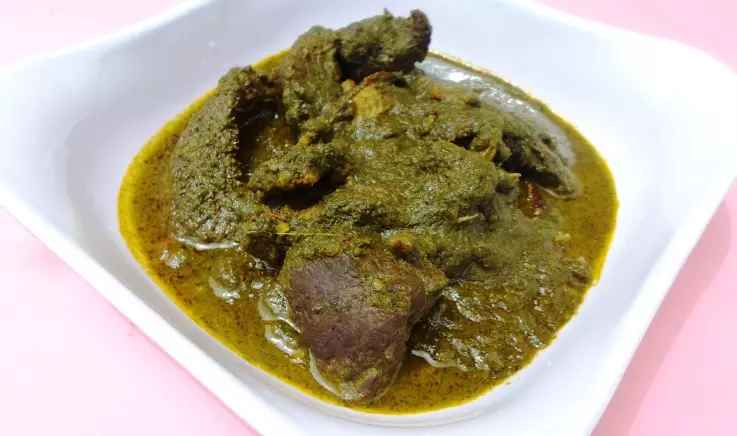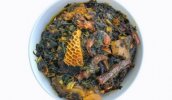In Nigeria, around the eastern part, scent leaf is called "new mom leaf.” It is popularly planted in the house as a vegetable, used to make meals and healthy drinks, or often eaten raw. Many health benefits have been attributed to the consumption of scent leaves. In this article, we will be exploring the health benefits of scent leaf soup postpartum.
What is scent leaf soup?
Scent leaves (botanically known as Ocimum gratissimum, a tropical plant species that belongs to the family of Labiatae) are native to Nigeria, Ghana, and parts of Africa and Asia. As a native shrub, it can be found on farms and gardens and is primarily used as a spice for cooking delicacies due to its aromatic taste.
Scent leave is commonly called;
- Efirin in Yoruba
- Ahuju or Nchanwu in Igbo
- Ganyen Kamsh or Doddo Ya in Hausa
- Aramogbo by the Edo’s
- Ntonng by the Ibibios
- Some parts of Ijaw call it Ekeni
- Kunudiri in Okrika
- Fobazen in Haiti
Nutritional components of scent leaf
Scent leaves contain:
- Protein
- Moisture
- Fat
- Ash
- Crude fiber
- Carbohydrate
- Dry matter (97.6 ± 0.05, 97.75 ± 0.03). Saponin
- Flavonoid
- Tannin, and
- Some macro- and micro-minerals
Health benefits of scent leaf soup
- Rapid healing: Research has shown that scent leaves may help heal the body, such as repairing the body tissues after delivery.
- Reduce baby colic: During the first few months after delivery, babies experience colic, where a healthy baby cries for longer without any apparent reason. Research has shown that the mother's consumption of scent leaf soup reduces colic in babies.
- Aids the production of breast milk: Though not proven scientifically, a survey carried out among new moms about the effectiveness of scent leaf suggests that the intake of scent leaf helps in the production of breast milk.
Is it safe to eat scent leaf soup in pregnancy?
There have been a lot of rumors about why pregnant women should not consume scent leaves. While some say it is at risk of causing an unnatural birth cycle, others say it harms the uterus.
There is no logical nor clinical confirmation/validation as regards this myth. This myth might result from how the leaf's substance makes the uterine walls contract during the monthly cycle.
It doesn't imperil your child's life, as it is likewise outstanding for its constructive outcome on estrogen chemical creation because of its substance in boron. From the advantages above, scent leaves aren't destructive.
Are there any side effects of eating scent leaf soup?
There are a few side effects of consuming excess scent leaf, which include:
- Unsafe for individuals who suffer from bleeding disorders or are scheduled for surgery: Scent leaf concentrates, for example, those found in enhancements, can thin the blood, prompting issues if you have a draining turmoil or a forthcoming medical procedure.
- Low circulatory strain: Scent leaves could lower the pulse in individuals with low circulatory strain.
- Surgery: It could slow blood thickening. In principle, scent leaves could increase the risk of bleeding during surgeries.
How to prepare scent leaf soup
- Wash the scent leaves and slice
- Blend your pepper and onion to your desired texture
- If you are using meat/fresh fish, season and boil first
- Pour palm oil into a pot and, on medium heat, let it bleach for 2 mins
- Add the blended pepper and onion and let it fry
- After a few minutes, check if the pepper mix has cooked, then add the meat/fish
- Add the locust beans (if desired), crayfish, and seasoning cube, and let the ingredients simmer for about 5 minutes
- Add the scent leaf, stir, and leave to boil for 2 minutes
Scent leaves can benefit you and your little one if prepared and taken proportionately. Remember to check with your doctor before adding this to your diet.
Frequently Asked Questions (FAQs)
- Is scent leaf soup the same as black soup?
No, they are different. However, depending on your taste and preference, scent leaves could be used as an ingredient when making black soup.
- Will scent leaf soup help with my PCV?
Yes, it can. Scent leaf extract infusion increases packed cell volume (PCV).
- Is scent leaf soup good postpartum?
Yes, it is. Scent leaves help with milk production and have excellent digestive properties. Remember to take in moderate portions.










Comments